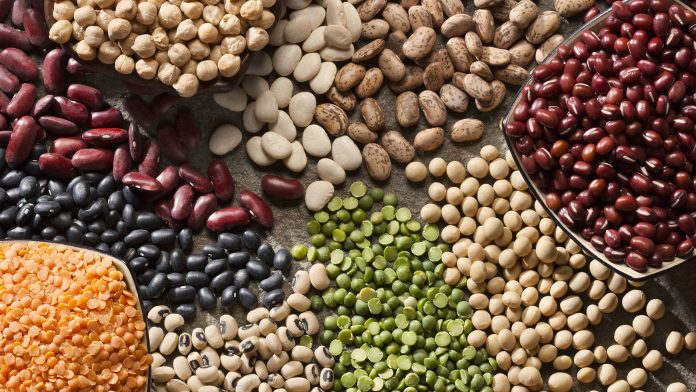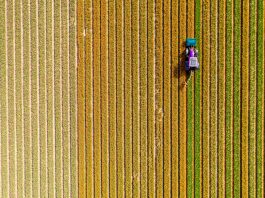Researchers have found that growing more legumes could be a more nutritious and sustainable food production approach for European agriculture.
A new study, published in Frontiers in Sustainable Food Systems, highlights that adding legumes, such as beans and lentils, to traditional crop rotations, such as barley, wheat, and rapeseed, offers considerable environmental benefits as well as enhanced nutritional value for humans and livestock.
“This strategy can contribute significantly to the specific European Union Green Deal Farm to Fork objectives to reduce greenhouse gas emissions, chemical pesticide use, and synthetic fertiliser use,” commented first author Marcela Porto Costa, of Bangor University in the UK. “For example, in Scotland, we’ve shown that the introduction of a legume crop into the typical rotation reduced external nitrogen requirements by almost half whilst maintaining the same output of food measured in terms of potential human nutrition.”
All crops need nitrogen to grow, which for the majority of crops, is provided via fertilisers. However, a growing body of evidence suggests that traditional fertilisers are not sustainable. This is because their production requires significant energy, they are depleting finite resources, and they pollute the surrounding environments.
One of the objectives of the European Union Green Deal Farm to Fork strategy is to tackle this problem, with goals to cut greenhouse emissions and chemical pesticide use by 50%, as well as reducing synthetic fertiliser use by 20% by 2030.
In contrast to other crop types, legumes are among the only crops that can get all of the nitrogen they require from the air around them. This is thanks to a symbiotic partnership with bacteria that transforms nitrogen in the air into a form that can be used by plants.
As well as this, legumes enrich the soil with nitrogen, which reduces the need for nitrogen fertilisers. They also offer a vast range of nutrients, such as protein, fibre, folate, iron, potassium, magnesium, and vitamins.
The approach by Costa and her team is more comprehensive than previous calculations of environmental footprints because it compares 10 different crop sequences using 16 different impact categories. Their assessment also represents a timeframe of three to five years and three different European climates in Italy, Romania, and Scotland.
“Our innovative approach goes beyond simple food footprints by looking at the footprint of delivering a specific quantity of human, or livestock, nutrition from all crops produced within representative crop rotations,” said Dr David Styles, who co-ordinated the study and is based at the University of Limerick in Ireland. “This provides a clearer picture of inter-crop effects and the overall efficiency of different cropping sequences in delivering nutritious food (or livestock feed).”
Currently, their approach only calculates the potential nutritional delivery. The quantity of nutrition provided by different rotations will also depend on how foods are processed and sold. Further research is also needed to develop better calculations for livestock feed. The team plans to extend this approach to other types of crop rotations and additional agricultural locations and climates.
“Our results strengthen evidence on the positive role that healthy diet transitions could make to environmental sustainability,” explained Styles. “Legumes provide a healthier balance of carbohydrates, protein, and fibre compared with cereal crops, and could improve the nutritional profile of the food we eat.”
“These results also highlight the need for whole-system (multi-crop, farm-to-fork) thinking when designing interventions to drive sustainable food systems so that we can deliver better nutrition whilst reducing environmental impacts,” added Costa.









